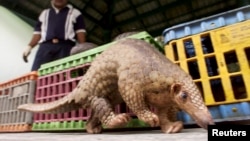Uganda’s wildlife authorities made a grim discovery recently at Entebbe International Airport: Hidden in mismarked crates were more than 700 kilograms or 1,543 pounds of elephant ivory and 2 tons of scales from pangolins, otherwise known as scaly anteaters.
The items’ seizure January 25 offered more evidence of the illegal wildlife trade that threatens species, frustrates law enforcement and environmentalists, and enriches poachers.
The East African nation has been clamping down on the trade illegal trade and, with tougher legislation in the works, is poised to do more, according to the Ugandan Wildlife Authority.
The black-market value of the ivory was estimated at almost $1.5 million and the pangolin scales at $1.2 million, the French news agency AFP reported. The wildlife authority is tracing the items, which likely include some that had been stolen from Ugandan government storerooms, AFP said.
Funding source for conflict
The illegal wildlife trade is often used to help fund militias and ongoing conflict in the Democratic Republic of Congo and South Sudan, said Jossy Muhangi, spokesman for the wildlife authority.
Although Uganda has made headway in removing poachers from its national parks, regional insecurity and porous borders mean that illegal goods can be easily moved through the country and sent abroad to Europe and Asia, he explained.
"I would not want to implicate our neighboring countries. But last year our veterinary unit carried out DNA tests" on ivory, Muhangi said. The tests showed some had come from Ruaha, a national park in southern Tanzania. Other samples were traced to eastern DRC.
While Muhangi acknowledged some poaching of elephant tusks in Uganda, the illegal trade "has been going down," he said. In 2011, 25 elephants were killed illegally in the country’s parks; two years later, the number of illegal killings had dropped to five.
Muhangi attributed the decline to the creation of "an intelligence unit that interacts with communities ... but we have also increased our ranger presence in most of the parks."
The wildlife authority has been working with agencies in Uganda and neighboring countries, creating interstate partnerships with rangers in South Sudan and the DRC. The partnerships enable representatives to go on joint patrols and to combine strategy meetings in border regions.
Bolstering weak laws
Muhangi said Uganda’s weak laws and minimal punishment for poaching make the illegal trade attractive. For instance, an Anglican priest and a former soldier convicted of possessing and trading illegal ivory were sentenced last year to 12 months in prison or a fine of 8 million shilling, approximately $2,800. They couldn't pay so they were imprisoned.
Relatively modest penalties suggest the country’s judiciary "had not fully appreciated the importance of wildlife," Muhangi said.
But new legislation passed by the Cabinet and being considered in the Parliament would impose on a suspected killer a fine equivalent to an animal’s value.
With mountain gorillas, "our leading tourist attraction," Muhangi said, "people pay hundreds of dollars to go and watch them for one hour.... So we should attach a value of the animal being killed and relate it to the fine."
"We want new laws now to increase the fines to become deterrents … to make it so risky for the poachers," he added.
The International Gorilla Conservation Program estimates the viewing permits generate $3 million annually. All told, gorilla-related tourism produces about $20 million a year for local hotels and communities, it said.
Parliament reconvenes this month, so there’s a chance it could push through new legislation for Uganda this year.





